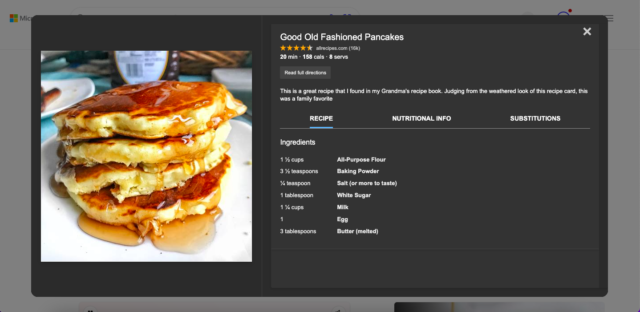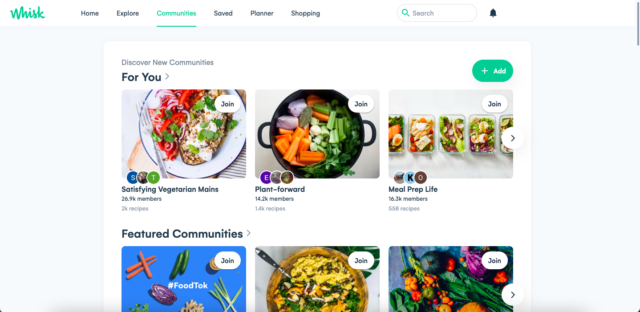What is ChatGPT and should you be worried?
Find out all the answers in this article written by Liam Smith, Founder of MealPro App., a former technology consultant working with global brands, and a health and fitness enthusiast.

It’s hard to talk about blogging right now without ChatGPT and AI coming up – the so-called “Google killer” has become the fastest-growing app in history.
As Lily at Food Bloggers of Canada said to me:
“These things can crawl everything and get answers in one place, without people having to click on to the website [and no traffic means no ad revenue and no sign-ups].”
These concerns are well-founded and will impact creators who refuse to adapt to the changes, but in this article you’ll learn concrete steps to stay ahead of the AI-curve, future-proof your income, and ensure your business survives this inevitable transformation.
In this article we’ll cover:
- What is ChatGPT?
- Will ChatGPT replace Google?
- Should you be worried?
- Here’s what to do (4 steps)
What is ChatGPT?
ChatGPT is a chatbot trained to act like a human – without getting too technical, it’s powered by a natural language model called GPT (both are owned by OpenAI).

Natural language models are not new. For example, if you use predictive text on your smartphone or have an Amazon Alexa, then you are already using this stuff.
However, like Facebook wasn’t the first social media platform, it seems like GPT might be the thing that sparks wide-scale adoption of these technologies.
Will ChatGPT replace Google?
ChatGPT won’t replace Google, but something powered by GPT might – like Bing. Another plausible option is that Google’s own chatbot (aka Bard) disrupts Google as we know it. Either way, it seems likely that traditional search will change.
Let’s examine how traditional search will change by looking at the new Bing, which incorporates an AI-powered chat.
Searches will produce “complete answers”
Instead of scrolling through multiple results, the chatbot will provide complete solutions to your inquiry compiled from multiple sites.
For example, if I ask the chatbot to plan a workout, I might get an AI-generated text response alongside the results:
“Unified” experiences (all in one place)
A unified experience suggests that people won’t need to click through to websites to get the information they need. This has got website owners particularly worried.
For example, if I ask it to help me make pancakes then I still get a variety of recipe options:



The new Bing also serves up different types of responses depending on what you are trying to do.
In another example, if I ask it a question that doesn’t need much explaining – like the weather forecast – it will produce similar results to today:

Should you be worried?
Yes and no.
It seems like click-through rates from search engines are going to be impacted – continuing a trend that includes things like Google’s Featured Snippets, which have been shown to increase “no click searches”.
But before you go running for the hills, let’s consider the current limitations of AI:
They still need you to create content
Did you know AI can’t actually create new knowledge yet? It only forms answers based on the information and training it has received to date.
Ask ChatGPT about current events – even the time – and you won’t get much help because it’s only been trained on data up until 2021.

As long as this remains true, these tech giants (Google, Bing, Meta, OpenAI, etc) will have a huge incentive to keep you around and happy… A.K.A. paying you for your content.
AI chatbots can’t be trusted (yet)
According to ChatGPT’s own website, it can produce “nonsensical” answers, and these can be hard to spot. Google has made similar comments about its own chatbot (Bard) too.
Even still, would you trust an AI-generated recipe that hasn’t been tested in a kitchen?
Enter YOU as the trusted face and brand.
This is why Bing still includes citations in their AI-generated results – so people can click through to “verify the information”. It’s reasonable to expect Google to do the same.
Chatbots are “not search”
Google has been quick to point out that chatbots are not search. As one executive said:
“They [chat bots] are great at generating human-sounding text, they are not good at ensuring their text is fact-based. Why do we think the big first application should be Search, which at its heart is about finding true information?”
Perhaps chatbots will complement search rather than replace it altogether. Bing is already testing separate tabs for search and chat. Google may well do the same thing.

Google makes too much money!
Google made $224 billion dollars in ad revenue in 2022, mostly from search.
To think Google could replace this revenue in the near future seems unlikely. And to think anyone has the resources to oust Google also seems unlikely, for now.
It seems like traditional search will be around a while longer and you will continue to have an important role in that ecosystem.
But even still – how can you deal with diminishing click-through rates and website traffic and the eventual possibility that one day you might not be as valuable to Google as artificial intelligence becomes more intelligent?
Let’s talk about it …
Here’s what to do
Here are four steps to stay ahead of the AI-curve and ensure your business survives the inevitable search transformation that’s coming:
- Continue producing valuable, informative content
The tech giants still need you to create new content.
The same can’t be said for regurgitated content from content mills – AI will be able to reproduce this stuff much more easily.
And – much like SEO today – they still need to decide what to include in their results, whether that is a traditional search engine results page, some kind of chatbot, or a mix.
There will be an even greater focus on creating and promoting original, high-quality content!
- Leverage AI-powered tools to your advantage
While AI-powered tools are a threat to your livelihood, they also present an opportunity to make your job easier and more scalable.
For example, AI-powered tools like Jasper and CopyAI can help you with various writing tasks like writing outlines, generating headlines, and proofreading.

- Consider new ways to be discovered
If you rely solely on Google or another platform for your traffic – and have the bandwidth – then consider adding another stream of traffic. That could be as simple as investing a bit more time on TikTok or Instagram, YouTube, or another platform.
There are also a growing number of social media-style recipe discovery platforms like Whisk and Peckish, which can be used to gain new fans.

- Diversify your income and build up your ecosystem
You work hard to get found – whether that’s on Google, Instagram, or another platform, but what happens when Google, Instagram, or any other platform decides to turn off your steady stream of traffic?
You’ve also done the hard work building a loyal following and a catalogue of recipes and content. So, why stop at getting people on your email list?
Here are six ways to develop new streams of income without needing to clone yourself or create tons of new content:
- Grow your newsletter: Work harder to attract new subscribers to your email list with free, valuable opt-ins and giveaways.
- Build a community: people desire connection more than most other things, and AI is unlikely to ever replace that (if it does, we'll have bigger problems!). As well as free groups, Facebook allows you to set up paid subscriber groups, for example.
- Launch a meal planning membership: Leverage your existing content using tools like MealPro App to launch your own-branded meal planning membership and earn recurring revenue, like The Girl On Bloor who went from zero to $2k/month in just six weeks (check out the free master class recording to learn how).

- Go mobile with your own app: Put your brand on their phone. It’s another way to talk to them through push notifications and is not reliant on a social media platform or search traffic.
- Offer gated content and ad-free experiences: Use tools like MemberPress to set up a website that helps you earn money without having to hassle with ads or sacrifice valuable space for them.
- Offer an online course or classes: If you are willing to invest time in creating new content, then offer an online course that solves your audience’s most pressing issue. To simplify the process, Kaitlin Nagy of Spatula Desserts started by recording live cooking classes and repurposed them as paid-for recordings.
Let’s wrap this up
Artificial intelligence is here to stay and with it comes a loss of control over how you’re discovered. This could close off some revenue streams for you, but also open new ones.
So, what’s your solution?
AI can’t create new knowledge, yet, and search engines still rely on you to create valuable and informed content.
And once it can, it’ll never replace the human interaction people crave from mediums like private communities, newsletters, and memberships.
To stay ahead of the shift, you should continue creating original, authoritative content whilst shifting people into your ecosystem of human interaction supported by new income streams like gated content, membership sites, and private communities.








Leave a Reply